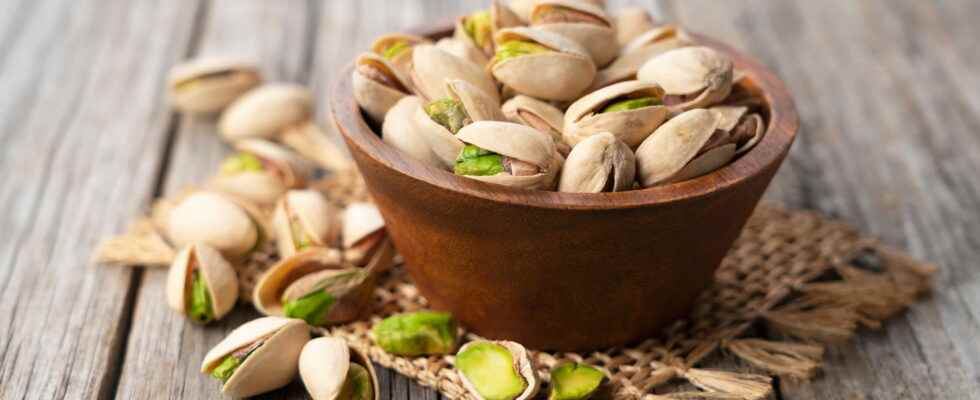If it is rich in lipids, the pistachio nevertheless has many health benefits. Fight against stress, protection against cardiovascular diseases, stimulation of the immune system… Overview of the benefits of this nut with Maxime Mességué, dietitian nutritionist in Paris.
What are the health benefits of pistachios?
The pistachio is a dry fruit that has many benefits for health. In fact, she participates in the weight management and the fight against heart disease because of its richness in fibre, unsaturated fatty acids and phytosterols. Moreover, due to its high in vitamins B1 and B6, in minerals (potassium, phosphorus) and trace elements (particularly copper and manganese), pistachio has a very high antioxidant power. This nut is also particularly interesting for promote eye health. “In terms of macronutrients, the pistachio is rich in protein and unsaturated fatty acids, making it an excellent snack for sports enthusiasts as well as vegetarians. Like all oilseeds, it is quite oily but it contains valuable omega 3 and omega 6 polyunsaturated fatty acids which are protective for cardiovascular health. From a micronutritional point of view, it is rich in B vitaminsessential for the proper functioning of the body, and vitamin E which protects against oxidative stress. Pistachio is also rich magnesium, recognized for its anti-stress properties. This nut also contains phytosterols, plant compounds that protect cardiovascular health and lower bad cholesterol (LDL) levels.“, develops Maxime Messegué.
What are the benefits of pistachios on the brain?
Rich in polyunsaturated fatty acids and in omega 3the pistachio plays a role in the prevention of mental disorders such as depression while improving concentration and memory skills. Pistachio has a high vitamin E content which has antioxidant power : it protects cells in general, and more particularly brain cells.
Do pistachios work against stress?
Thanks to their richness in magnesium, pistachios are useful for combat stress, fatigue, anxiety and depression. “Moreover, in case of food cravings, a handful of unsalted pistachios provides fiber, satiety and good nutrients that help fight stress“, specifies the nutritionist.
The best time to eat pistachios is probably the snack because they provide a lot of energy. On average, a handful of pistachios (about 30g) provides 200 calories. Pistachios can also be eaten breakfast or added to dishes. “It is interesting to associate them with a fruit or to mix with other oilseeds like almonds or walnuts to maximize these benefits“, recommends the specialist.
How much to consume per week?
It is possible to consume pistachios daily but in reasonable quantities, no more than a small handful (30g). “Ideally, it is best to limit consumption to three times a week and vary the types of oilseeds (almonds, walnuts, hazelnuts…)“, argues our interlocutor. On the other hand, it is necessary avoid consuming salted pistachios because it can lead to an excess of salt, which is not recommended for people who suffer from hypertension and water retention.
Pistachio oil: what benefits?
Pistachio oil has the same interest as the pistachio itself. It’s a concentration of fatty acids, it gives good taste to salads and should be eaten raw rather than cooked.
What are the dangers of too much pistachio?
Since pistachios have a high energy density, the main risk is to consume too much and unbalance the energy balance. “As good as they are for your health, excessive consumption of pistachios may lead to a caloric surplus that could promote weight gain“, warns the dietitian-nutritionist. However, if consumed in reasonable quantities, the pistachio is excellent for your health.
thanks to Maxime Messeguedietitian nutritionist in Paris.
